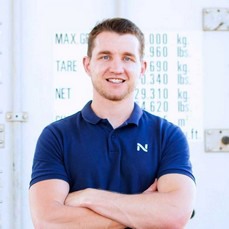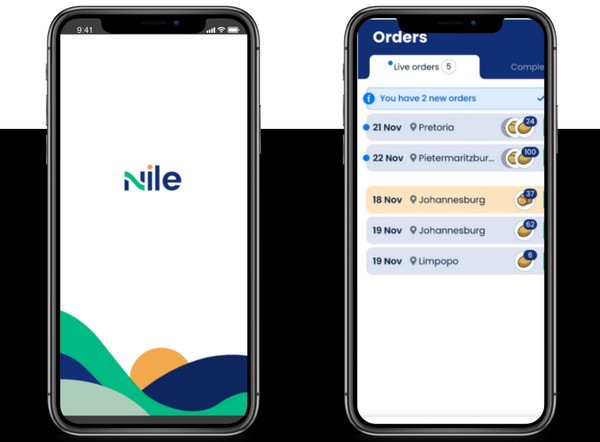Many things have changed in the last year, most people now buy a lot more online due to the lockdowns and we are becoming more accustomed to this way of life. One company was just getting established in February 2020 just before the global pandemic hit the world.
Nile is an online trading platform for the fresh produce sector in Africa which connects buyer and seller on the African continent.
Louis de Kock, founder of the company, is from a farming background so appreciates how the sector works and understands where the pain points are. He worked in Nairobi for a big e-commerce company where he was responsible for the cross-border platform and has walked a lot of fresh produce markets and unformal markets. While doing so he realised there was a big price disparity between products in Kenya and those in South Africa, for example potatoes were expensive and avocados were cheap in Kenya, whereas it is the other way around in South Africa.
 He asked himself the question “Why can’t we have better price transparency and digitalise trade between these countries?”
He asked himself the question “Why can’t we have better price transparency and digitalise trade between these countries?”
“The African Free Trade agreement is coming into place which should make it easier to trade between African countries and I think the food system should become more international and less regional. The reason you have these big price disparities is because you have very localised food systems,” explains Louis.
Louis worked for Amazon Fresh and launched the Fresh produce division of Amazon Go Grocery in the US which gave him a really good idea how fresh produce works in the online markets and omni-retail.
“We decided to go for a B2B platform as we believe the unit economics works better for fruit and vegetables to be traded in bulk and of course with logistics. The platform facilitates the wholesale trading of fresh produce mainly within the African continent. We have many of South Africa’s biggest producers already on the platform and we trade mainly through all of Southern Africa, all 9 provinces within South Africa but also our neighbouring countries.
“I think the situation which arose from the pandemic helped us in a few ways; firstly many more people started to use ecommerce for the first time to order products online because they couldn’t get them from their local stores and farmers started to sell online for the first time. This included commercial sellers who were buying things online for personal use. So the idea of buying and selling wholesale fresh produce online was less foreign to them. People also realised how fragile the food system was, especially when borders started to close down.”

How do you get produce from one place to the other if you are not allowed to travel, and being at markets physically was also much more difficult? This also put a spotlight on the cross-border trade and showed how fragile that is. Also, is it really necessary for cross border traders to physically come to South Africa to buy the product or could they order it online?
“The volumes which we trade are increasing very quickly and we are growing fast so I believe there is a need for what we are doing. Once we enter the rest of the continent, I think that growth should increase. There are already a lot of opportunities in Southern Africa.
“We want to be a one stop shop, we try to offer the entire fresh produce range both vegetables and fruit. We have been adding more and more products and are almost at the point where we offer the whole basket. We have added some very experienced and well know people to our team, from both the retail sector and from well-known fresh produce companies, we are expanding very quickly and are able to attract some very good, experienced talent from within the industry.”
The e-commerce and online trading is just a small part of what Nile offers – “We are building a marketplace. When people visit or send produce to a physical marketplace they do so believing it will be sold and they will get a fair price and will be paid for it. So, we have to try to recreate all of these elements online for it to work. We offer payment security; all transactions have to be either paid upfront meaning the money will be in our trust account before the order is sent or if it is on credit there will be credit insurance so there is 100% guarantee around money.”
There is also dispute mechanism in place, Nile have partnered with Prokon which is South Africa’s leading fresh produce inspector. They are the arbitrator on the platform so if anything goes wrong they will arbitrate and make a decision.

Farmers are able to set the pricing themselves on the platform which gives transparency.
“Vetting is carried out on both buyers and sellers, we only have reputable farmers on the platform. Both big and small producers, they all understand the packhouse and hygiene requirements and have the certification. On the buyer’s side we try to understand who the buyer is, we don’t have any agents on the platform and we don’t allow any intermediaries only buyers that add value and stick to the fundamentals of the market. It is very important for us to understand what the buyers are doing with the products and that our platform serves the purpose of making food more accessible and affordable.
Louis said that the physical movement of the products is also very important. “If you take Amazon as a business, it is actually solving a logistical problem. Anyone can sell products online but Amazon’s ability to deliver produce in a very effective and efficient way is what makes it work. We took the same approach when building the logistical side of the business, we have three ways in which a product can reach a buyer, one is a direct shipment where the farmer is responsible for delivering it to the buyer, the second is farm gate collection. The third is cross-docking through our hub in Jo’burg. We can process very complex transactions at the hub, for example the farmer doesn’t have to send a full truck he can send one pallet or five pallets.
Like any business Nile has had growing pains, but Louis said they are definitely solving a lot of problems in the value chain, which is why people are using the service. They are not just using it because it is online, again that is a small component of what the company does. It just uses technology to make the process better.
“We want to encourage more consumption of fresh produce by making it more widely available and more affordable. We are not looking to take market share from traditional businesses, we are able to deliver fresh produce at a more efficient price point and fresher and we want people to able to consume more. We don’t want to be fighting over pieces of the pie, we want to expand the pie for everyone. We all have our part to play in the value chain.”
For more information: Louis de Kock
Louis de Kock
Nile
Tel: +27 71 264 7669
louis@nile.ag
www.nile.ag
